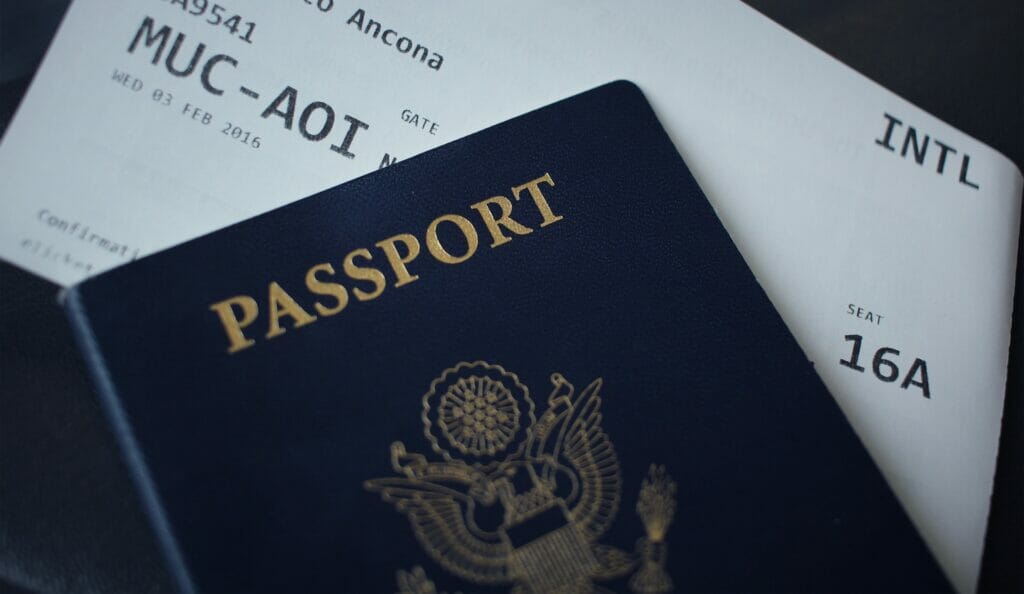What makes an Embassy or Consulate reject your Visa application typically involves issues like incomplete documentation, insufficient financial proof, or failure to demonstrate a legitimate purpose for your intended trip.
Who needs a Visa to Portugal?
Whether an individual requires a visa to enter Portugal is contingent upon their nationality. Portugal has established visa-exempt agreements with 62 countries and territories, which include Schengen states, the UK, the USA, and others. Citizens of these countries do not need a visa for short visits lasting up to 90 days.
For visits exceeding 90 days, individuals of foreign nationalities typically must apply for national visas, irrespective of their citizenship. However, there is an exception for EU citizens, who can establish residency in Portugal for an extended duration by merely registering their address with the Portuguese authorities.
How to get a Visa for Portugal?
Step 1 – Determine the type of visa you need
- Tourist Visa (Schengen Visa): For tourism, visiting family or friends, or attending cultural or sporting events for up to 90 days.
- Long-Stay Visa: For stays exceeding 90 days you topically need a residency visa such as Portugal D7 Visa, D2 Visa, Digital Nomad Visa or others.
Step 2 – Schedule an appointment at the Portugal Embassy or Consulate
Some Portuguese Embassies or Consulates require applicants to schedule an appointment in advance. Check the embassy’s website for instructions.
Step 3 – Gather the required documents
- Completed visa application form.
- Valid passport with at least two blank pages.
- Passport-sized photos meeting specific requirements.
- Proof of travel itinerary, including flight reservations.
- Proof of accommodation in Portugal.
- Travel insurance with a minimum coverage of 30,000 euros.
- Proof of financial means to support yourself during your stay.
- Depending on the visa type, you might need additional documents like an invitation letter, employment contract, or enrollment confirmation from a Portuguese institution.
Step 4 – Attend an interview
Depending on your nationality and the type of visa, you may need to attend an interview at the embassy or consulate. You also need to pay the visa fee: Visa fees vary depending on the type of visa and your nationality.
Step 5 – Wait for a decision
The processing time for a Portuguese visa varies depending on the type of visa and your nationality. It can take several weeks, so apply well in advance of your intended travel date.
Step 6 – Collect your visa and Travel to Portugal
If your visa is approved, you’ll need to collect it in person from the embassy or consulate. Once you have your visa, you can travel to Portugal within the specified dates.

What Is a Visa application rejection?
Visa rejection refers to the specific circumstance where an immigration authority or consulate refuses to grant a visa to an applicant, resulting in the denial of the visa application.
In this situation, the application is thoroughly reviewed, but the outcome is negative, meaning that the applicant is not granted permission to enter the country for the intended purpose.
10 Reasons why Visa application gets rejected
1. Incomplete Application
Incomplete visa applications can be a major stumbling block in the immigration process. The application forms provided by consulates or embassies are designed to collect specific information relevant to your visa category. Any omission or vague responses can lead to visa rejection.
It’s strongly advisable applicants to thoroughly review and fill out the application form, ensuring that every section is completed accurately. It’s also essential to include all required supporting documents and pay close attention to any additional instructions provided by the immigration authorities.
2. Invalid Letter of Reference
A valid letter of reference, often required for various visa applications, should come from a credible source, such as an employer, educational institution, or recognized authority in the applicant’s field.
Ensure that applicants understand the importance of providing a well-written, genuine reference letter. It should include the referee’s contact information, their professional relationship with the applicant, and specific details about the applicant’s qualifications or character relevant to the visa application.
Emphasize the need for accuracy and honesty in reference letters to avoid potential visa rejection.
3. Inadequate Travel Purpose Explanation
The purpose of travel should be clear and consistent with the visa category applied for. Applicants must articulate their intentions convincingly, providing relevant documentation to support their claims.
Applicants should research the visa requirements and tailor their applications to match the specific criteria. Clarity and coherence in explaining the travel purpose can significantly enhance the chances of visa approval.
4. Insufficient Financial Means
Demonstrating financial stability is a critical aspect of most visa applications. Immigration authorities want assurance that applicants have the financial means to support themselves during their stay without resorting to illegal employment or public assistance.
For Portugal visa you need to deposit in your Portuguese bank account a minimum of €9,840 and in case of joining family members to the application, the following amounts must be added: €4,920 for the partner /spouse and €2,952 for each child.
Additionally applicants can provide comprehensive and up-to-date financial documentation, such as bank statements, pay stubs, employment letters, or sponsorship letters, depending on their circumstances. The financial evidence should align with the intended duration and purpose of the trip.

5. Lack of Travel Insurance
Travel insurance is increasingly becoming a prerequisite for visa approval, especially in Schengen countries and other destinations. It serves as a safety net for unexpected medical expenses and emergencies during the trip. Immigration officials want to ensure that applicants are adequately protected and won’t burden the local healthcare system.
It’s crucial for applicants to research the specific insurance requirements of their destination and choose a policy that complies with those requirements. Providing proof of valid and adequate travel insurance can significantly enhance the chances of visa approval and prevent the rejection that may result from its absence.
6. False Information and Documentation
Providing false or misleading information or fake documentation on a visa application is a serious offense and can lead to visa rejection, as well as potential legal consequences. It’s imperative to stress the importance of complete honesty throughout the application process.
Applicants should be aware that immigration authorities thoroughly verify the information provided. Advising applicants to double-check all details, including personal information, travel history, documentation and any declarations they make, is vital to avoid falling into this trap.
7. Lack of Proof of Accommodation
Proof of accommodation is a crucial requirement for visa applications, as it demonstrates that the applicant has a place to stay during their visit. This can include a letter of invitation from a host, or a rental agreement for a private residence.
Advise applicants to ensure that their accommodation documentation is up-to-date, accurately reflects their travel plans, and aligns with the intended duration of their stay.
Failing to provide adequate proof of accommodation can lead to visa rejection, so it’s essential to emphasize this requirement.
8. Criminal Record
A criminal record can significantly impact visa applications. Immigration authorities often conduct background checks to assess an applicant’s criminal history. Some countries have strict policies regarding entry for individuals with certain types of criminal convictions, especially those involving violence, fraud, or drug-related offenses.
It’s essential to inform applicants about the potential consequences of having a criminal record and, if necessary, advise them on how to apply for waivers or legal remedies to address these issues.
9. Unfavorable Schengen Visa Situation
A history of visa violations, such as overstaying a previous visa, can significantly undermine a new visa application. Authorities may view applicants with previous violations as a potential risk for non-compliance.
If an applicant has a history of visa issues, it’s crucial to address these matters transparently in the new application, explaining any extenuating circumstances and demonstrating a commitment to complying with visa rules in the future.
10. Not Attending a Visa Interview
Not attending a visa interview can be a significant reason for visa rejection. Many countries, especially for certain visa categories, require applicants to attend an in-person interview at the embassy or consulate. The interview is an opportunity for consular officers to assess the applicant’s credibility, intentions, and eligibility.
Failure to attend the interview without a valid and documented reason, such as a medical emergency or unforeseen circumstances, can lead to a visa denial.

How to proceed after a Visa rejection
Checking the reasons for a Schengen visa rejection can be essential to understand why your application was denied and to address any issues before reapplying. Here are the steps to check Schengen visa rejection reasons:
1. Review the Rejection Letter
When your Schengen visa application is denied, you should receive a written rejection letter from the consulate or embassy where you applied. This letter typically outlines the specific reason(s) for the rejection. Carefully read the letter to understand the grounds for the denial.
2. Understand the Rejection Codes
Schengen rejection letters often contain specific codes that correspond to the reason for the rejection. These codes are standardized across Schengen member countries. You can find a list of these rejection codes on the official website of the respective Schengen country’s consulate or embassy.
3. Consult an Immigration Attorney
If you are unsure about the rejection reasons or need guidance on how to proceed, consider consulting an immigration attorney or legal expert with experience in Schengen visa applications. They can provide personalized advice and assistance.
4. Reapply, If Applicable
If you believe that you have resolved the issues that led to the rejection, you can reapply for a Schengen visa. Ensure that your new application addresses the previous reasons for rejection and includes any additional documents or information required.
Why work with a Portuguese lawyer for your visa application?
There are several compelling reasons for working with a Portuguese immigration lawyer when dealing with immigration matters in Portugal. Here are some key reasons:
1. Expertise
Immigration lawyers specialize in the intricacies of immigration law and are familiar with the specific requirements, procedures, and documentation needed for different immigration processes. They can help you gather the required documentation, fill out application forms correctly, and submit them within the specified deadlines.
2. Representation
If necessary, an immigration lawyer can represent you during interviews, hearings, or appeals. They can effectively communicate and advocate on your behalf, ensuring that your rights and interests are protected throughout the process.
3. Language
If you are not fluent in Portuguese or unfamiliar with the local culture and customs, an immigration lawyer can bridge the language and cultural gaps. They can communicate with immigration authorities on your behalf, translate documents, and provide culturally appropriate advice to ensure effective communication and understanding.
4. Success
By working with an immigration lawyer, you increase your chances of a successful outcome. Any mistakes or oversights can have serious consequences, including delays, rejections, or even immigration violations. An immigration lawyer can help minimize risks by providing guidance, ensuring compliance with regulations, and avoiding common pitfalls.
Still wondering? Take a look at our video!
Frequently Asked Questions About Reasons Why a Visa Application Gets Rejected
What is the mains reasons for visa rejection in Portugal?
While there isn’t a single most common reason, incomplete documentation and insufficient proof of financial means are often cited as common causes for visa rejection.
How can I avoid my Portugal visa application being rejected?
Consulting with a lawyer or a relocation company can be a wise step when applying for a visa, especially if you’re unsure about the requirements or if you’ve faced a previous rejection.
How bad is a visa rejection?
A visa rejection is typically seen as a temporary setback, as applicants have the option to appeal the decision or rectify the identified issues and submit a new application.
Can I appeal a Portugal visa rejection?
Yes, in many cases, you can appeal a visa rejection. However, the appeal process can be complex, and it’s essential to follow the specific guidelines provided in your rejection letter.
What is the most popular visa to Portugal?
The most popular visas to Portugal include the Portugal D7 visa, D2 visa, Digital Nomad Visa, and the Golden Visa as an investment visa.
How long it takes to get a Consulate's decision?
Regarding visa approval, an applicant should typically receive a decision within up to 60 days from the date of submission. However, processing times can vary depending on factors like visa type and consulate workload.
Why would a visa application get rejected?
The primary cause of visa denial typically stems from either missing documents or insufficient evidence to substantiate your eligibility for visiting the intended country.
How to check visa rejection reasons?
When your Schengen visa application is denied, you should receive a written rejection letter from the consulate or embassy where you applied. Schengen rejection letters often contain specific codes that correspond to the reason for the rejection. These codes are standardized across Schengen member countries and you can find a list
Do i need a visa to Portugal from the USA?
U.S. citizens can visit Portugal for tourism or business purposes without a visa for up to 90 days within a 180-day period. For longer stays or for purposes such as residency, a different type of visa, such as a residency visa, would be required, and the application process for such visas may have additional requirements and procedures.
Are the any specific US visa rejected reasons?
The visa rejection reasons for U.S. applicants are not different from other countries, such as incomplete documentation and eligibility.




